S E N S O
Luchino Visconti
(1954)


Italiano
Venezia, 1866: nel corso di una recita del Trovatore alla Fenice, gli irredentisti organizzano un lancio di volantini. Il tenente austriaco Franz Mahler, che insulta gli italiani, viene allora sfidato a duello dal patriota, conte Ussoni, che tuttavia viene tosto arrestato dalla polizia austriaca e condannato ad un anno di esilio.
Per intercedere a favore del cugino, la bella contessa Livia Serpieri si avvicina al tenente Mahler e se ne innamora follemente. Pur sposata, intreccia una relazione clandestina con il giovane ufficiale, fatta di incontri e di abbandoni frequenti, ed infine, proprio in pieno svolgimento della terza guerra d'indipendenza italiana, cede alle sue richieste di denaro, giungendo a consegnargli i soldi destinati ai patrioti italiani che Ussoni, rientrato dall'esilio, le aveva affidato, affinché lui possa corrompere i medici per farsi esonerare dal servizio militare.
Ma dopo aver scoperto che quei soldi gli erano serviti, oltre che allo scopo previsto, anche, e molto, per divertirsi alle sue spalle, si vendica denunciandolo e lascia che venga fucilato come disertore.
Note
Senso è un film diretto da Luchino Visconti nel 1954.
Il regista si è ispirato per questo suo film al testo di Senso, la novella omonima scritta da Camillo Boito per testimoniare la crisi di una società che agisce a fianco della Storia, senza potervi partecipare.
Rispetto all'opera letteraria, Visconti pone in secondo piano la relazione fra Livia e Franz per poter dare maggior risalto alla vicenda storica. Il denaro che Ussoni affida a Livia e che lei incautamente donerà al tenente austriaco è un elemento che manca completamente nel racconto.
Boito dà al tenente austriaco il nome Remigio Ruz, ma Visconti lo cambiò in Franz Mahler in omaggio al suo compositore preferito, di cui poi si servì anche per musicare il successivo Morte a Venezia.
Aiutoregisti del film sono Francesco Rosi e Franco Zeffirelli, entrambi all'epoca all'inizio della carriera.
Visconti non poté intitolare il film Custoza e fu costretto a reinserire la scena della fucilazione del tenente Mahler, in un primo momento eliminata, perché la produzione e la censura italiana avrebbero altrimenti ritenuto la vicenda disonorevole dal punto di vista patriottico.
In questa opera, Visconti sprigiona il gusto per il melodramma, uno stile epico ideologizzato, un severo controllo della recitazione.
English
Senso is set in Italy around 1866, when the Italian-Austrian war of unification was coming to an end. The story opens in the La Fenice opera house in Venice during a performance of Il Trovatore. At the close of Manrico's rousing aria Di quella pira, the opera is interrupted by a boisterous protest by Italian Nationalists against the occupying Austrian troops present in the theater. Livia Serpieri, an Italian countess, unhappily married to a stuffy older aristocrat, bears witness to this and tries to conceal the fact that her cousin Marquis Roberto Ussoni has organized the protest. During the commotion, she meets a dashing young Austrian Officer named Franz Mahler, and is instantly smitten with him. The two begin a secretive love affair. Despite the fact that Franz was responsible for sending Roberto into exile for his radical behavior, Livia vainly pretends not to be aware of it.
Although he is obviously using her for her money and social status, Livia throws herself into an affair of complete sexual abandon with Franz, giving away her money and not caring what society thinks about her. But soon, Franz begins failing to show up for their trysts and Livia becomes consumed by jealousy and paranoia. The war finally forces the lovers apart, with Livia's husband taking her away to their villa in the country in order to avoid the carnage. Late one night, Franz arrives on the estate, and secrets himself into Livia's bedroom. He asks her for more money to bribe the army doctors into keeping away from the battlefield; Livia complies, giving away all of the money she was holding for Roberto, who intended to supply it to the partisans fighting the Austrians. Livia's betrayal leads to tragic consequences; the Austrians overwhelm the under-equipped Italians.
Eventually, Livia is almost driven mad by the fact that she's unable to see Franz, but rejoices when a letter from him finally arrives. In the letter, Franz thanks Livia for the financial support that helped him stay away from the front. He advises Livia not to look for him, but she does not listen. As soon as possible, Livia, still grasping the letter, boards a carriage and hurries to Verona to find her lover. Once there, Livia makes her way to the apartment, which she herself has rented for Franz. What she finds is a drunken, self-loathing rogue, in the company of a young prostitute, openly mocking Livia for accepting his abuse.
After forcing her to sit and drink with the prostitute, Franz brutally throws Livia out of his rooms. She finds herself in the streets, filled with drunken, amorous Austrian soldiers. Livia realizes that she still has Franz's letter, but nothing remains now except mutual self-destruction. Her sanity slipping, Livia heads to the headquarters of the Austrian Army, where she hands Franz's letter to a General, thereby convicting Franz of treason. Although the General sees that Livia is acting out of spite for being cuckolded, he is forced to comply and Franz is executed by firing squad. Livia, now insane, runs off into the night, crying out her lover's name.
Notes
Senso is a 1954 melodrama film, an adaptation of Camillo Boito's Italian novella Senso by the Italian director Luchino Visconti, with Alida Valli as Livia Serpieri and Farley Granger as Lieutenant Franz Mahler.
Originally, Visconti had hoped to cast Ingrid Bergman and Marlon Brando in the lead roles, but Bergman was not interested in the part, and Brando was nixed by the producers who considered Granger a bigger star, at the time. Both Franco Zeffirelli and Francesco Rosi, later accomplished film and theater directors in their own right, worked as Visconti's assistants on the picture.

Senso
Titolo originale Senso
Paese Italia
Anno 1954
Durata 117 min
Colore Colore
Audio Sonoro
Genere Drammatico, Sentimentale
Regia Luchino Visconti
Soggetto Camillo Boito
Sceneggiatura
Carlo Alianello, Giorgio Bassani,
Suso Cecchi d'Amico, Giorgio Prosperi,
Luchino Visconti
Produttore Lux Film
Fotografia Aldo Graziati, Robert Krasker
Montaggio Mario Serandrei
Musiche Anton Bruckner, Giuseppe Verdi
Scenografia Ottavio Scotti
Costumi Piero Tosi, Marcel Escoffier
Interpreti e personaggi
* Alida Valli: Livia Serpieri
* Farley Granger: Franz Mahler
* Moog Heinz: Conte Serpieri
* Massimo Girotti: Roberto Ussoni
* Cristoforo De Hartungen: generale Hauptmann
* Rina Morelli: Laura
* Christian Marquand: ufficiale
* Marcella Mariani: Clara
* Sergio Fantoni: patriota
* Goliarda Sapienza: patriota
* Tino Bianchi: Meucci
* Anita Cerquetti: non accreditata
* Marcella Rovena
Doppiatori italiani
* Enrico Maria Salerno: Farley Granger


Clicca sull'immagige per ingrandire
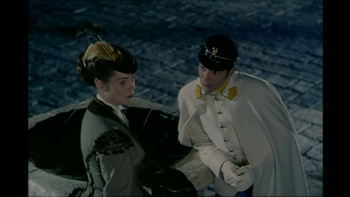
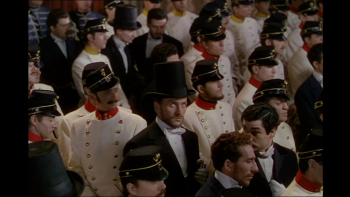
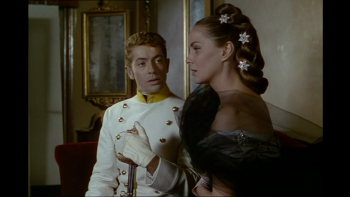
Clicca sull'immagige per ingrandire
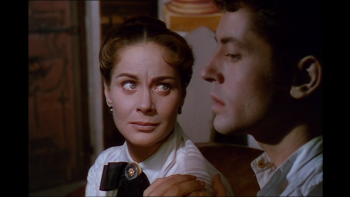
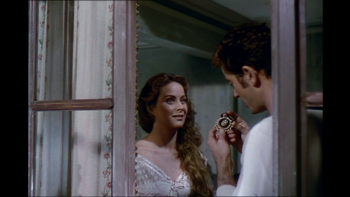
TECNICAL DATA
DVD5
Size: 4,35GB
Languages: Italiano
Subtitles: Italiano - English
Region: 2 PAL
Running Time: 117min
Extra: No
Resolutio: 16:9
DVD DOLBI DIGITAL
Please Rest in Seed!









